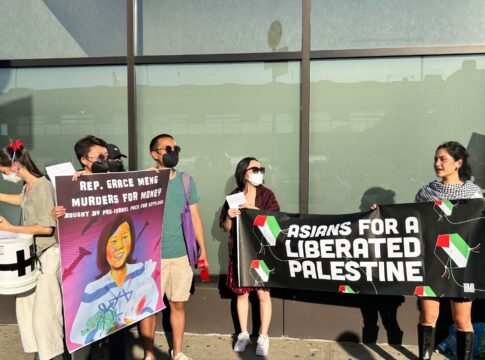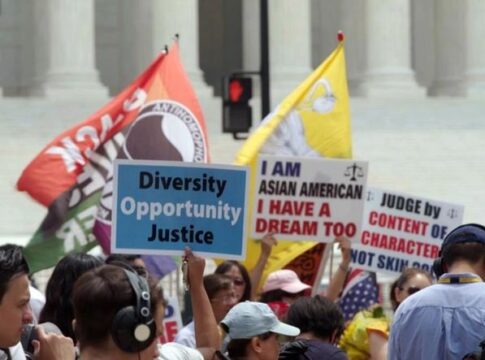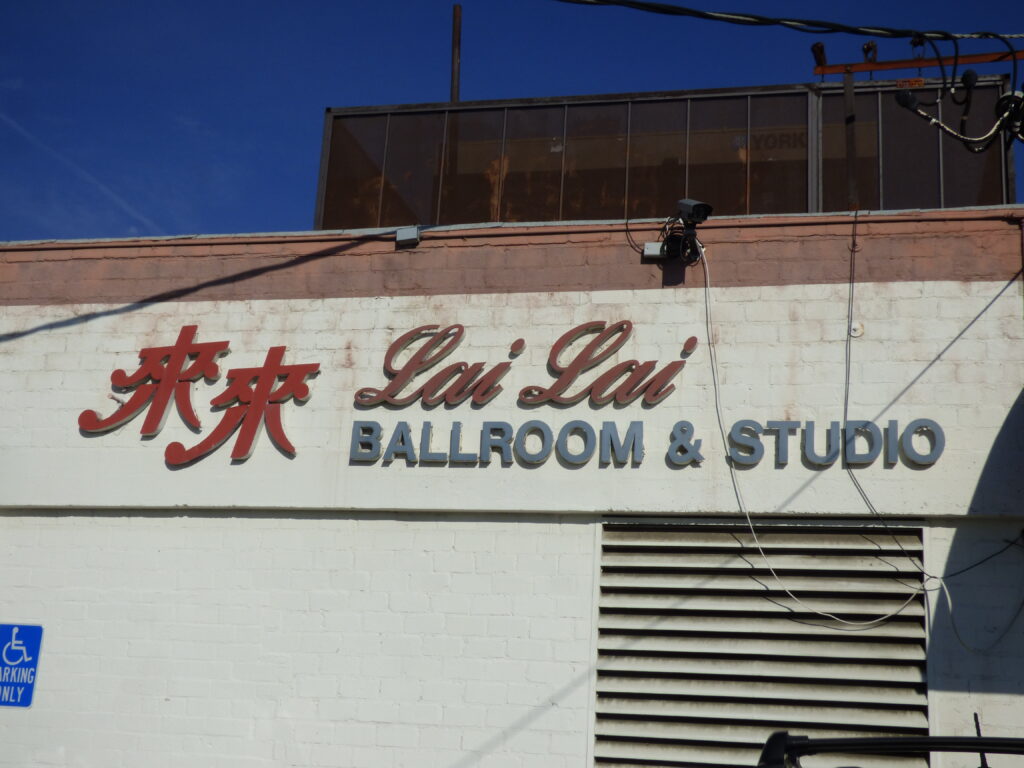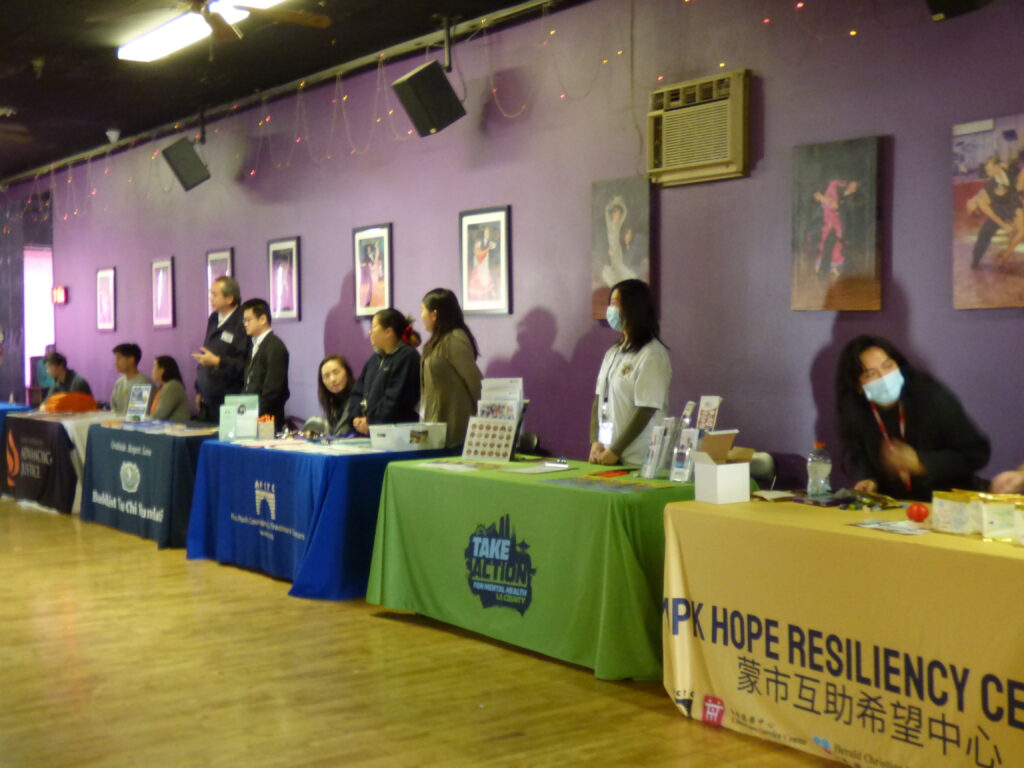by Alan Oda
Nearly a year ago Brandon Tsay subdued a gunman while working at his family’s Lai Lai Dance Studio in Monterey Park. His courageous actions averted greater tragedy after 11 were killed and nine injured just minutes before at the nearby Star Ballroom and Dance Studio.
On Saturday, the Lai Lai Ballroom was filled again, this time with the local dancing community gathered to honor those lost while also raising awareness of mental health and community resources for the Chinese and Asian American communities.
“I never thought so many people would come, just because I hosted the event,” said Tsay, a computer programmer and the assistant manager of the family-owned studio. “But for community members, it’s pretty much an important aspect in our healing process in the face of dire tragedy.”

The event combined ballroom dancing with an opportunity for local mental health and community organizations to meet with the public. Chun-Yen Chen, Executive Director of the Asian Pacific Community Fund (APCF), emceed the event.
LATEST STORIES
“Brandon is actually the one who initiated this event. He reached out to APCF and shared that (with) this anniversary coming up, he asked what else can he do to support our community.” Chen extolled Tsay who opened Lai Lai for free, “to connect you with important community resources. Brandon opened up his ‘second home’ which is Lai Lai, to allow a community platform.”
Said Tsay, “I saw many individuals struggling with coping about what has happened, how dangerous our public is, but in tandem there has been some paranoia about going out again, I just wanted to ensure and calm people’s nerves.”
The 27-year-old Tsay was working the entrance of the Lai Lai studio on the night of January 21, 2023. Huu Can Tran, a past patron of local Chinese dance studios, had already fired 42 rounds at the Star Ballroom and Dance Studio in neighboring Alhambra, killing 11 people. The 72-year-old Tran entered Lai Lai, about three miles away from the Star Ballroom less than 20 minutes later, ostensibly looking for more victims. Tsay confronted Tran and wrestled the gun away before chasing the shooter out of the Lai Lai ballroom. “Brandon dislikes being referred to as a hero,” said Tran, “but that’s who he is.”
Tsay explained the purpose of the gathering. “We need to come back as in the life of the situation, it’s a time to celebrate what has happened, how our community has bonded back together again, to really confide in each other, our struggles and hardships over the (past) few months.” He said he has personally had experienced therapy “to process this in tandem with how this affected my life but how I also want to inspire (others to experience) a similar process in healing.” Tsay also believed in addition to therapy, “we’re offering an alternative such as dancing and music, it’s very therapeutic to seniors nowadays.”
He acknowledged the challenges of reopening Lai Lai. “Before the incident, we were already dealing with the previous restrictions due to Covid,” already making it complicated to reopen and keep Lai Lai in business.
“After the tragedy, we thought we may never open again, yet we had to open because if we did close, the shooter would have accomplished his intent to damage our community of dancers here. We would never want to see that, we love the enthusiasm, the passion that they have for music and dancing, that’s why we wanted to open again, whatever the cost.“
Also in attendance was US Representative Judy Chu, Congress Member for the 28th California congressional district.
“The community came forward to help the victims and the wounded, they did these GoFundMe sites that helped all who were affected,” said Chu. “The Monterey Park Hope Resiliency Center (created after the tragedy) has the right idea, which is to help by having that center that’s always there, you can drop in and interact in a way that’s comfortable for you.”
“It may be just being with others and doing the arts and crafts and taking a few dance lessons and just being able to socialize with others can bring them out of their shell and they can feel like they are like everybody else. But I also hope that anybody who feels distraught, depression, anxiety that they do get the actual counseling they need because it is there,” she added.
Chu is sponsoring two bills, one to provide information in Chinese and other languages about California’s Red Flag law. The law allows the temporary removal of firearms from someone believed to be a danger to themselves or others.
“What is apparent to me from the shooting is that people could see this man was mentally deteriorating and that he was kind of a threatening (presence),” said Chu. “Somebody saw that he was accumulating ammunition, somebody could have used the Red Flag law to report him to the authorities but nobody did. I would say that he talked to those who were immigrants, yet the vast majority would not know what is the Red Flag law.”
Chu’s other bill provides $50 million in grants to community organizations providing information and resources to help implement the Red Flag law.
My My Nhan, 65, was one of the Star Ballroom fatalities. Her niece, Fonda Quan, traveled from her Texas home to pay tribute to her aunt.
“When we were cleaning up (Nhan’s) very filled room, we found a lot of receipts, a lot of donation receipts, dating back to the 1980s,” Quan said.
The family noted most of the receipts were to charity organizations benefiting both seniors and youth programs.

“We decided to create a legacy fund to specifically support programs that are going to support seniors and youth. And that is how we’re going to continue giving back as a way to honor (my aunt) and to recover as a society as well,” Quan said.
“I want us to focus on how we move on, individually and as a community together and that’s how we’re going to honor everyone who was lost last year,” she added. “We lost 11 precious individuals, but what I have seen now is an over ten-fold increase in community relationships created because of this, and I’m especially proud of that, that shows exactly how resilient we are, and it is really heartwarming to see.”
Tsay continues to advocate for mental health and other community resources, including his creation of the Senior Safety and Health program in collaboration with the Asian Pacific Counseling and Treatment Center.
“(Since last year) the journey has been quite chaotic, and to say the least it’s been eventful. I think it’s been 180 change in my life, I’m usually not one speaking out and organizing my own programs to use my voice for good,” said Tsay. “I think one challenge is to really expose our Asian community to mental health and resources to help them know they don’t need to bottle their emotions inside until they explode, causing an incidence of violence which is basically a conduit for their life issues.”
Additional community agencies in attendance included the Buddhist Tzu Chi Foundation; Los Angeles County Bureau of Victim Services; Los Angeles County Take Action for Mental Health; and Asian Americans Advocating for Justice.
As the crowd started to gather on the Lai Lai dance floor, Tsay recalled traveling with Representative Chu to Washington DC, where he was recognized at the 2023 State of the Union address.
“I have met (California) Governor Gavin Newsom, President Joe Biden, and Vice-President Kamala Harris,” said Tsay. “But the real standouts I’ve met are the local community heroes who inspire me to go out and speak more. I’ve also met a lot of local heroes at local events which really makes me want to strengthen my own resilience.”
AsAmNews is published by the non-profit, Asian American Media Inc. Follow us on Facebook, X, Instagram, TikTok and YouTube. Please consider making a tax-deductible donation to support our efforts to produce diverse content about the AAPI communities. We are supported in part by funding provided by the State of California, administered by the California State Library in partnership with the California Department of Social Services and the California Commission on Asian and Pacific Islander American Affairs as part of the Stop the Hate program. To report a hate incident or hate crime and get support, go to CA vs Hate.












